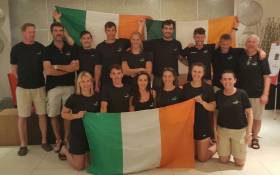Displaying items by tag: Rowers of Month
Ireland Team the Afloat Rowers of the Month for September
#Rowing: The Ireland team which brought the country glory at the World Rowing Championships in Florida are the Afloat Rowers of the Month for September. In that month, Ireland took two gold medals through Mark O’Donovan and Shane O’Driscoll in the lightweight pair and Paul O’Donovan in the lightweight single sculls.
The pair crowned the perfect season with their victory. They won gold at the three World Cup regattas and the European Championships. The pressure was on in World Championship final, with both Brazil and Italy rowing well on the day. But O’Donovan and O’Driscoll were peerless. They set a very high stroke rate, took the lead – and saw off their challengers.
Paul O’Donovan retained the title he had taken with such an extraordinary set of performances in Rotterdam in 2016, just weeks after he had taken a silver at the Olympic Games in a lightweight double with his brother Gary. This time, Gary had to drop out of the lightweight double, as illness had restricted his training (he supported the team as a reserve). Paul was back in the lightweight single in a boat which was new to him. He won all four races (heat, quarter-final, semi-final and final), seeing off a new set of challengers in the lightweight single, including Matthew Dunham of New Zealand, who took silver, and Kris Brun of Norway (bronze).
The rest of the Ireland team also gave the suppporters plenty to shout about. Sanita Puspure went on to take fourth in the single sculls and Denise Walsh reached the A Final of the lightweight single sculls, where she finished sixth. Two new heavyweight pairs gained experience of the top level as the team targets Tokyo 2020. Aileen Crowley and Aifric Keogh finished eighth and there was a 16th place for Patrick Boomer and Fionnán McQuillan-Tolan.
Well done to all the members of the Ireland team, the Afloat Rowers of the Month for September.
Rower of the Month awards: The judging panel is made up of Liam Gorman, rowing correspondent of The Irish Times, and David O'Brien, editor of Afloat magazine. Monthly awards for achievements during the year will appear on afloat.ie. Keep a monthly eye on progress and watch our 2017 champions list grow.
Ireland Oarsmen the Afloat Rowers of the Month
#Rowing: The Rowers of the Month for July are Mark O’Donovan and Shane O’Driscoll of Skibbereen. The Irish Championships offered a list of great performances: the Commerical senior eight won a thrilling final; the Cork Boat Club junior pair of Amy Mason and Tara Hanlon impressed and would go on the take silver at the Coupe de la Jeunesse; the rising star that is Daire Lynch took three titles. However, O’Donovan and O’Driscoll had the outstanding run, taking five titles: together they won the senior pair and senior double, while O’Donovan won the senior single sculls and O’Driscoll the lightweight single. They also teamed up with Fintan McCarthy and Kenny McCarthy to win the senior quadruple. The combined efforts of all the Skibbereen crews brought them 13 titles, lifting the west Cork club to 163 in total, clear at the top of the rankings as the most successful Irish club.
Mark O’Donovan and Shane O’Driscoll will represent Ireland in the lightweight pair at the World Championships in Rotterdam in late August.
Rower of the Month awards: The judging panel is made up of Liam Gorman, rowing correspondent of The Irish Times, and David O'Brien, editor of Afloat magazine. Monthly awards for achievements during the year will appear on afloat.ie and the overall national award will be presented to the person or crew who, in the judges' opinion, achieved the most notable results in, or made the most significant contribution to rowing during 2016. Keep a monthly eye on progress and watch our 2016 champions list grow.





























































